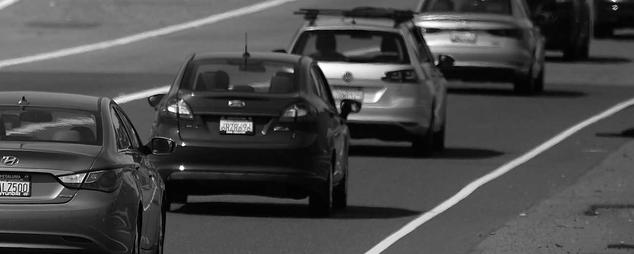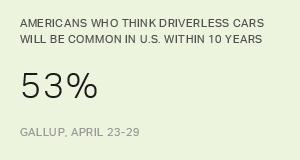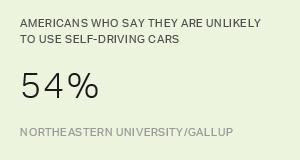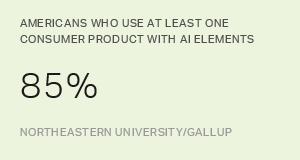Story Highlights
- 75% would use own human-operated car even if driverless cars were common
- 52% say they would never want to use a self-driving car
- 34% personally enjoy driving "a great deal"; 44% "a moderate amount"
WASHINGTON, D.C. -- Automakers and technology companies aiming to make driverless cars ubiquitous on U.S. roads will have to win over most Americans. Three in four Americans indicate they would still own or lease a car that they personally drive once driverless technology becomes commonplace.
| Own/Lease a car to personally drive | Own/Lease a driverless car | Not own any car (vol.) | No opinion | ||||||||||||||||||||||||||||||||||||||||||||||||||||||||||||||||||||||||||||||||||||||||||||||||
|---|---|---|---|---|---|---|---|---|---|---|---|---|---|---|---|---|---|---|---|---|---|---|---|---|---|---|---|---|---|---|---|---|---|---|---|---|---|---|---|---|---|---|---|---|---|---|---|---|---|---|---|---|---|---|---|---|---|---|---|---|---|---|---|---|---|---|---|---|---|---|---|---|---|---|---|---|---|---|---|---|---|---|---|---|---|---|---|---|---|---|---|---|---|---|---|---|---|---|---|
| % | % | % | % | ||||||||||||||||||||||||||||||||||||||||||||||||||||||||||||||||||||||||||||||||||||||||||||||||
| U.S. adults | 75 | 19 | 2 | 4 | |||||||||||||||||||||||||||||||||||||||||||||||||||||||||||||||||||||||||||||||||||||||||||||||
| Based on a sample of 718 adults with a margin of error of ±5 percentage points | |||||||||||||||||||||||||||||||||||||||||||||||||||||||||||||||||||||||||||||||||||||||||||||||||||
| GALLUP, April 23-29, 2018 | |||||||||||||||||||||||||||||||||||||||||||||||||||||||||||||||||||||||||||||||||||||||||||||||||||
These findings are from an April 23-29 Gallup poll that explored Americans' driving habits and their attitudes toward cars -- both human-operated and driverless. While majorities of all demographic groups say they would want to own or lease a car that that they personally drive even when self-driving cars are common, there were several notable differences among subgroups.
-
Those who do not enjoy driving much or at all (36%) are three times as likely as those who enjoy driving a great deal (11%) to say they would own a driverless car.
-
College graduates (29%) are more than twice as likely as those who are not college graduates (13%) to say they would own a self-driving car.
-
Americans living in cities (23%) and suburbs (24%) are more than twice as likely as those living in small towns and rural areas (10%) to say they would own a driverless car.
Although automobile manufacturers and technology companies are investing billions in making self-driving cars a common part of Americans' daily lives, the public is generally taking a wait-and-see approach with these vehicles. Only 9% of Americans say they would use the technology immediately once it is certified by government auto-safety regulators, while 38% say they would wait a while and 52% would never want to use a driverless car.
| Use one as soon as possible | Wait a while to use | Never want to use | No opinion | ||||||||||||||||||||||||||||||||||||||||||||||||||||||||||||||||||||||||||||||||||||||||||||||||
|---|---|---|---|---|---|---|---|---|---|---|---|---|---|---|---|---|---|---|---|---|---|---|---|---|---|---|---|---|---|---|---|---|---|---|---|---|---|---|---|---|---|---|---|---|---|---|---|---|---|---|---|---|---|---|---|---|---|---|---|---|---|---|---|---|---|---|---|---|---|---|---|---|---|---|---|---|---|---|---|---|---|---|---|---|---|---|---|---|---|---|---|---|---|---|---|---|---|---|---|
| % | % | % | % | ||||||||||||||||||||||||||||||||||||||||||||||||||||||||||||||||||||||||||||||||||||||||||||||||
| U.S. adults | 9 | 38 | 52 | 1 | |||||||||||||||||||||||||||||||||||||||||||||||||||||||||||||||||||||||||||||||||||||||||||||||
| Based on a sample of 785 adults with a margin of error of ±4 percentage points | |||||||||||||||||||||||||||||||||||||||||||||||||||||||||||||||||||||||||||||||||||||||||||||||||||
| GALLUP, April 23-29, 2018 | |||||||||||||||||||||||||||||||||||||||||||||||||||||||||||||||||||||||||||||||||||||||||||||||||||
-
Adults younger than age 50 (55%) are more likely than those aged 50 to 64 (46%) and those 65 and older (32%) to indicate they would use the technology either as soon as possible or at least after some time has passed.
-
Men (53%) are more likely than women (40%) to say they would use a driverless car at some point.
-
Similarly, more college graduates (58%) say they would use autonomous cars than do those without college degrees (41%).
-
And Americans with household incomes of $90,000 or more (57%) are more likely than those with household incomes under $90,000 (45%) to say they would either wait a while to use self-driving cars or use them immediately.
Cars Are an Essential, Enjoyable Part of Most Americans' Lives
Americans and cars are inextricably linked, with 86% saying they own or lease some kind of vehicle and 83% reporting that they personally drive at least most days of the week. Although 30% of the public say they use ride-sharing services such as Uber or Lyft, significantly fewer, 12%, say they use public transportation at least weekly.
| U.S. adults | ||||||||||||||||||||||||||||||||||||||||||||||||||||||||||||||||||||||||||||||||||||||||||||||||||||
|---|---|---|---|---|---|---|---|---|---|---|---|---|---|---|---|---|---|---|---|---|---|---|---|---|---|---|---|---|---|---|---|---|---|---|---|---|---|---|---|---|---|---|---|---|---|---|---|---|---|---|---|---|---|---|---|---|---|---|---|---|---|---|---|---|---|---|---|---|---|---|---|---|---|---|---|---|---|---|---|---|---|---|---|---|---|---|---|---|---|---|---|---|---|---|---|---|---|---|---|---|
| % | ||||||||||||||||||||||||||||||||||||||||||||||||||||||||||||||||||||||||||||||||||||||||||||||||||||
| Type of transportation | ||||||||||||||||||||||||||||||||||||||||||||||||||||||||||||||||||||||||||||||||||||||||||||||||||||
| Currently own or lease a car or other vehicle | 86 | |||||||||||||||||||||||||||||||||||||||||||||||||||||||||||||||||||||||||||||||||||||||||||||||||||
| Use ride-sharing services like Uber and Lyft | 30 | |||||||||||||||||||||||||||||||||||||||||||||||||||||||||||||||||||||||||||||||||||||||||||||||||||
| Use public transportation, such as a bus, subway or train, at least once a week | 12 | |||||||||||||||||||||||||||||||||||||||||||||||||||||||||||||||||||||||||||||||||||||||||||||||||||
| Personally drive a car or other vehicle | ||||||||||||||||||||||||||||||||||||||||||||||||||||||||||||||||||||||||||||||||||||||||||||||||||||
| Every day | 64 | |||||||||||||||||||||||||||||||||||||||||||||||||||||||||||||||||||||||||||||||||||||||||||||||||||
| Most days in a week | 19 | |||||||||||||||||||||||||||||||||||||||||||||||||||||||||||||||||||||||||||||||||||||||||||||||||||
| Few times a month | 6 | |||||||||||||||||||||||||||||||||||||||||||||||||||||||||||||||||||||||||||||||||||||||||||||||||||
| Rarely | 4 | |||||||||||||||||||||||||||||||||||||||||||||||||||||||||||||||||||||||||||||||||||||||||||||||||||
| Never | 6 | |||||||||||||||||||||||||||||||||||||||||||||||||||||||||||||||||||||||||||||||||||||||||||||||||||
| GALLUP, April 23-29, 2018 | ||||||||||||||||||||||||||||||||||||||||||||||||||||||||||||||||||||||||||||||||||||||||||||||||||||
Americans also like to drive -- more than three in four (78%) say they personally enjoy driving "a great deal" or "a moderate amount." The remaining 21% say they do not enjoy driving "much" or "at all."
| U.S. adults | |||||||||||||||||||||||||||||||||||||||||||||||||||||||||||||||||||||||||||||||||||||||||||||||||||
|---|---|---|---|---|---|---|---|---|---|---|---|---|---|---|---|---|---|---|---|---|---|---|---|---|---|---|---|---|---|---|---|---|---|---|---|---|---|---|---|---|---|---|---|---|---|---|---|---|---|---|---|---|---|---|---|---|---|---|---|---|---|---|---|---|---|---|---|---|---|---|---|---|---|---|---|---|---|---|---|---|---|---|---|---|---|---|---|---|---|---|---|---|---|---|---|---|---|---|---|
| % | |||||||||||||||||||||||||||||||||||||||||||||||||||||||||||||||||||||||||||||||||||||||||||||||||||
| A great deal | 34 | ||||||||||||||||||||||||||||||||||||||||||||||||||||||||||||||||||||||||||||||||||||||||||||||||||
| A moderate amount | 44 | ||||||||||||||||||||||||||||||||||||||||||||||||||||||||||||||||||||||||||||||||||||||||||||||||||
| Not much | 13 | ||||||||||||||||||||||||||||||||||||||||||||||||||||||||||||||||||||||||||||||||||||||||||||||||||
| Not at all | 8 | ||||||||||||||||||||||||||||||||||||||||||||||||||||||||||||||||||||||||||||||||||||||||||||||||||
| No opinion | 1 | ||||||||||||||||||||||||||||||||||||||||||||||||||||||||||||||||||||||||||||||||||||||||||||||||||
| GALLUP, April 23-29, 2018 | |||||||||||||||||||||||||||||||||||||||||||||||||||||||||||||||||||||||||||||||||||||||||||||||||||
Notably, 41% of men say they enjoy driving a great deal while only 27% of women say the same.
Bottom Line
Although positive impressions of the auto industry reached record highs recently, the American public is not yet on board with the direction auto manufacturers are headed -- rolling out driverless cars on U.S. roads. Americans are reliant on their cars and enjoy driving. Automakers will have to convince the public that not only is self-driving technology safe, but that the safety, environmental and other benefits it offers outweigh the pleasure people get from driving.
Survey Methods
Results for this Gallup poll are based on telephone interviews conducted April 23-29, 2018, on the Gallup U.S. Poll with a random sample of 1,503 adults, aged 18 and older, living in all 50 U.S. states and the District of Columbia. For results based on the total sample of national adults, the margin of sampling error is ±3 percentage points at the 95% confidence level. All reported margins of sampling error include computed design effects for weighting.
Each sample of national adults includes a minimum quota of 70% cellphone respondents and 30% landline respondents, with additional minimum quotas by time zone within region. Landline and cellular telephone numbers are selected using random-digit-dial methods.
View survey methodology, complete question responses and trends.
Learn more about how the Gallup U.S. Poll works.





